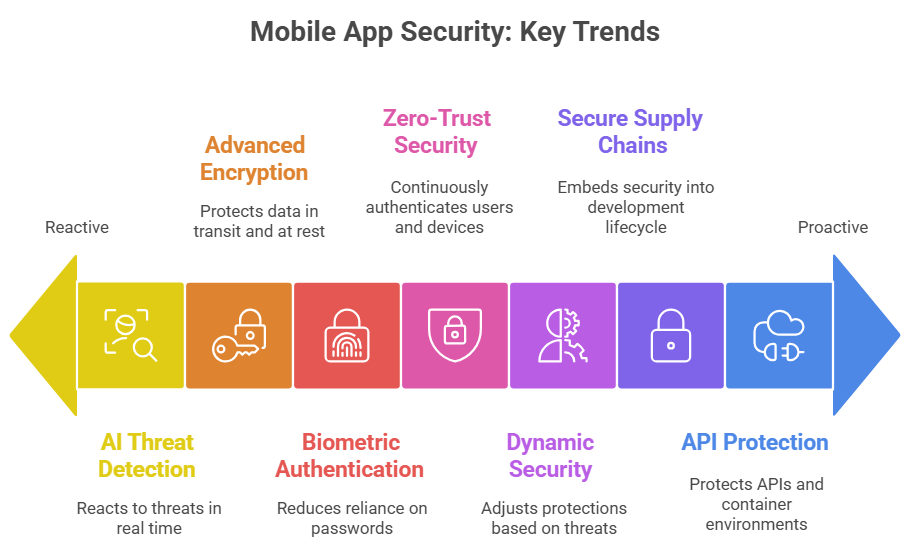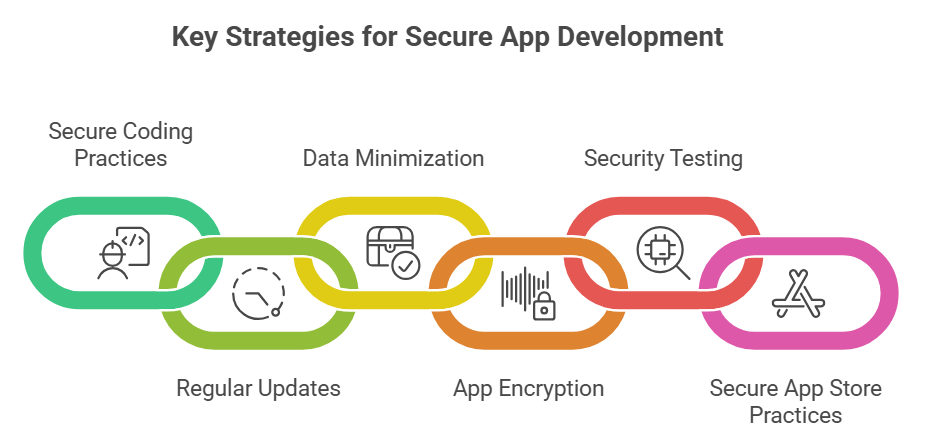Security First: Protecting Your App in a Connected World
Mobile apps have become integral to our daily routines, whether we’re chatting with friends on social media, managing our finances through banking apps, shopping with a few swipes, or accessing essential services. These apps keep us connected, productive, and entertained but with all this convenience comes a significant concern: app security. As businesses across the globe embrace mobile technology, the need for secure app development is more critical than ever.
With cyber threats becoming more sophisticated and data breaches on the rise, ensuring your app’s security is paramount. Whether you’re building a custom app or integrating new features into an existing one, understanding how to protect user data and maintain the integrity of your app is a top priority.
In this blog, we’ll explore the importance of mobile app security in today’s connected world, how custom mobile app development company can help mitigate risks, and why integrating advance technologies like machine learning is crucial to building secure apps.
The Alarming Rise of Mobile App Threats
Cyber attacks targeting mobile applications have surged dramatically, affecting both large enterprises and growing startups. Recent studies highlight that four out of five mobile apps have at least one critical vulnerability, making sensitive user data highly exposed. Data breaches alone have climbed by over 54% in the past year, as cybercriminals exploit weak coding practices, outdated platforms, and poor vetting of third-party integrations.
High-profile incidents, such as fitness apps leaking GPS and health data, have led brands to rethink their approach to app security moving from reactive patching to proactive development.
Mobile App Development in Digital Transformation
Mobile app development is driving digital transformation initiatives worldwide. Today’s organizations use custom mobile app development companies to build seamless, scalable apps that leverage AI, IoT, blockchain, and cloud-native architectures. However, the complexity and speed of digital innovation have widened the attack surface for malicious actors.
- Security must be treated as a core app feature, not a last-minute checklist item.
- Compliance with regulations such as GDPR, HIPAA, and PCI is central to modern app design.
- Automated testing, code reviews, and continuous monitoring are becoming baseline requirements for secure delivery.
Mobile App Security: Key Trends
To stay ahead of attackers, companies are embracing critical new trends:

AI-Driven Threat Detection
Artificial intelligence and machine learning now play a central role in mobile app security. Smart algorithms monitor user behavior, flag anomalies, and respond to threats in real time, defending apps from emerging exploits that traditional tools fail to catch.
Advanced Encryption and Data Protection
Data protection is paramount. End-to-end encryption is standard for communications, storage, and cloud backups. Leading secure app development practices ensure that sensitive data such as passwords and payment details is encrypted both in transit and at rest using industry protocols.
Biometric and Password less Authentication
Fingerprint, facial, and device-based biometric authentication have become mainstream in financial and healthcare apps, reducing reliance on passwords and blocking credential phishing attempts.
Zero-Trust Security Models
Zero-trust approaches where no user, device, or system is automatically trusted are essential for apps handling sensitive transactions. Continuous authentication and device integrity checks prevent lateral movement by attackers and add robust layers of defense.
Dynamic, Adaptive Security
Static safeguards alone are no longer enough. Developers now use dynamic security models that adjust protections in real time, based on active threats and user behavior. For example, policy-based access changes and server-side attestation ensure resilient, flexible app defenses.
Secure Supply Chains and DevSecOps
Regulations and industry standards are prompting organizations to lock down the entire software supply chain. DevSecOps is embedding security into every stage of the development lifecycle, making secure coding a cultural habit rather than an afterthought.
Enhanced API and Platform Protection
With the rise of microservices and API-based architectures, protecting APIs and container environments is non-negotiable. Modern mobile apps regularly face threats to APIs, requiring robust authentication, rate-limiting, and runtime protection.
Data Protection: The Heart of Secure Apps
Data breaches have lasting financial and reputational impacts. As such, custom mobile app development companies focus on:
- Strict access controls and multi-factor authentication.
- Encrypted backups, secure key management, and automated patching.
- Defensive coding and privacy-first design principles at every layer.
Security starts at the earliest phase of development, not post-launch. Privacy-by-design is now a market expectation among users and regulators.
Impact of Machine Learning on Mobile App Development
Machine learning has transformed mobile app experiences personalizing content, recommending services, and enabling intelligent automation. It’s also revolutionized security. ML models scan millions of interactions, spot unusual behaviors, and prevent account takeovers, fraud, and bot-driven abuse with minimal human intervention.
AI-driven security frameworks adapt in real time, making it possible to deploy robust threat detection without sacrificing performance or user experience.
Best Practices for Secure App Development
For organizations partnering with a custom mobile app development company, consider these best practices:
- Adopt secure coding standards and conduct independent code reviews.
- Integrate automated mobile application security testing (MAST) into the continuous integration and deployment pipeline.
- Use hardware-backed authentication for high-value operations.
- Limit app permissions and request only what’s essential for functionality.
- Monitor application environments continuously for new threats.
- Keep all platforms, libraries, and dependencies up-to-date with regular patches.
Challenges and Solutions
Despite technology advances, several challenges remain:
- The pace of innovation can introduce new vulnerabilities as teams focus on features over security.
- Attackers constantly evolve, using automation, reverse engineering, and social engineering to target apps.
- Balancing frictionless user experience with robust security controls requires thoughtful design and testing.
By integrating layered defenses, continuous monitoring, and proactive strategies, custom mobile app development companies can help organizations overcome these hurdles and build lasting user trust.
Key Strategies for Secure App Development
To ensure that your mobile app is secure, here are some essential strategies to follow throughout the app development lifecycle:

- Secure Coding Practices: Secure coding is the first line of defense against security vulnerabilities. Follow best practices like input validation, error handling, and secure storage to minimize the risk of vulnerabilities in the app’s code.
- Regular Updates and Patch Management: Cybersecurity threats are constantly evolving, which means your app needs to be regularly updated. Patch management is essential for keeping your app safe from new vulnerabilities and exploits.
- Data Minimization: Only collect and store the data that is absolutely necessary for your app to function. The less data you store, the less there is to steal in case of a breach.
- App Encryption: Ensure that all sensitive data within the app is encrypted both at rest and in transit. This includes data stored on the device and information transferred over the internet.
- Security Testing: Regular security testing, including penetration testing and vulnerability scans, is essential for identifying and mitigating risks early in the development process.
- Secure App Store Practices: Ensure your app adheres to the security guidelines of app stores (e.g., Google Play Store and Apple App Store). These guidelines are designed to protect users from malicious apps and enhance overall app security.
Final Thoughts
Security isn’t just a technical goal it’s a strategic advantage for brands shaping the digital future. By prioritizing data protection, dynamic security, and seamless user experience, your organization can confidently deliver innovative mobile solutions. For businesses seeking a trusted partner, App Maisters a custom mobile app development company offers proven expertise in secure app development, ensuring your digital assets remain protected while driving growth and transformation.
FAQs
How can AI-driven security improve mobile app protection?
AI-driven security uses machine learning to detect anomalies and respond to threats in real-time, enhancing app defense. App Maisters integrates AI to proactively protect your app.
What are the best practices for secure mobile app development?
Adopt secure coding, conduct code reviews, use automated security testing, encrypt data, and limit app permissions. App Maisters follows these best practices to ensure app security.
Why is data protection critical for mobile app security?
Data protection prevents breaches, which can harm your brand and users. App Maisters uses encryption and multi-factor authentication to keep data safe and meet compliance standards.
What role does biometric authentication play in mobile app security?
Biometrics like fingerprint and facial recognition reduce password reliance, enhancing security. App Maisters integrates biometric authentication to secure user access.
How can mobile apps benefit from a Zero-Trust security model?
Zero-Trust continuously verifies users and devices, minimizing risk. App Maisters applies this model to safeguard sensitive data and prevent unauthorized access.
What is the impact of machine learning on mobile app security?
Machine learning detects threats in real-time, preventing fraud and account takeovers. App Maisters uses ML to strengthen your app’s security while maintaining performance.
How do App Maisters ensure secure supply chain management in mobile app development?
App Maisters secures the app development lifecycle with DevSecOps, continuously monitoring and protecting third-party integrations and APIs.




















